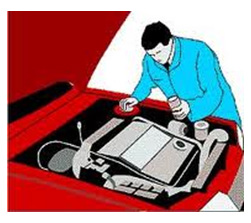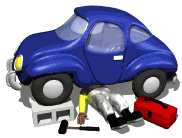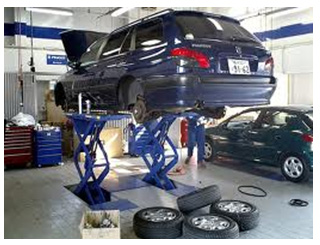 Regular vehicle maintenance is critical to ensure the safety, reliability, drivability, comfort and longevity of a car. During the regular maintenance, car’s subsystems are inspected, tested and a number of parts maybe replaced to avoid major damage or for safety reasons.
Regular vehicle maintenance is critical to ensure the safety, reliability, drivability, comfort and longevity of a car. During the regular maintenance, car’s subsystems are inspected, tested and a number of parts maybe replaced to avoid major damage or for safety reasons.
 Click for Links and “How To” Information about Vehicle Maintenancehttp://www.dmv.org/how-to-guides/vehicle-maintenance.php
Click for Links and “How To” Information about Vehicle Maintenancehttp://www.dmv.org/how-to-guides/vehicle-maintenance.php
- The actual schedule of car maintenance varies depending on the year, make and model of a car. It also depends on driving conditions and driver behavior.
- Car makers recommend an ideal service schedule based on following parameters that impact the vehicle:
- Number of trips and distance traveled per trip per day
- Extreme hot or cold climate conditions
- Mountainous, dusty or de-iced roads
- Heavy stop-and-go vs. long-distance cruising
- Towing a trailer or other heavy load
- Driving conditions and behavior of the car owner or driver.
Common car maintenance tasks include:
- Check/replace the engine oil and replace oil filters

- Check/replace fuel filters
- Inspect or replace windshield wipers
- Check or refill windshield washer fluid
- Inspect tires for pressure and wear
- Tire balancing
- Tire rotation
- Wheel alignment
- Check, clean or replace battery terminals and top up battery fluid
- Inspect or replace brake pads
- Check or flush brake fluid
- Check or flush transmission fluid
- Check or flush power steering fluid
- Check and flush engine coolant

- Inspect or replace spark plugs
- Inspect or replace air filter
- Inspect or replace timing belt and other belts
- Lubricate locks, latches, and hinges
- Check all lights
- Tighten chassis nuts and bolts
- Check if rubber boots are cracked and need replacement
- Test electronics (ABS)
- Read fault codes from the engine control unit
- Car wash

Breakdowns and costly repairs can be avoided by keeping your exhaust system in good working order.
Realize that changes in noise level, smelling an abnormal amount of fumes and rattling underneath your vehicle signal problems with your exhaust system.
The exhaust system should be inspected for leaks and secure attachment along with other regular maintenance.
- It is illegal to modify your exhaust system so as to increase the noise level of your vehicle or install a by-pass devise that allows it to increase.
- Your exhaust system should not have leaks that increase the noise level. Leaks in your exhaust system are dangerous because they expose you to carbon monoxide and other toxic gases.
- The law requires (in most cases) that you have an emission test every two years at the time of registration or at time of sale. It is a good idea to have your smog control components checked at the time of a tune-up.
Maximizing Vehicle Economic Operation
There are several things you can do to maximize the economic operation of your motor vehicle.
- Avoid making fast starts and stops and cornering too fast. They are not only unsafe, but increase the cost of operating and maintaining your vehicle by wasting fuel and wearing out tires and brakes.
- Drive slower
- Faster driving requires more fuel to get you the same distance. Obey speed limits and you will save fuel and reduce the risk to others, as well as saving money.
- Anticipate when you will need to stop.
- Excessive quick braking wears your brakes and tires. Look ahead while you are driving so you can anticipate when you will need to stop and can do so smoothly and gently.
- Periodic or preventative maintenance of your vehicle will also lower your long-term operation costs. Periodic tune-ups reduce fuel consumption by making your vehicle run more efficiently. The money you spend on periodic maintenance can also save you large expenses due to major engine failure and breakdown.

